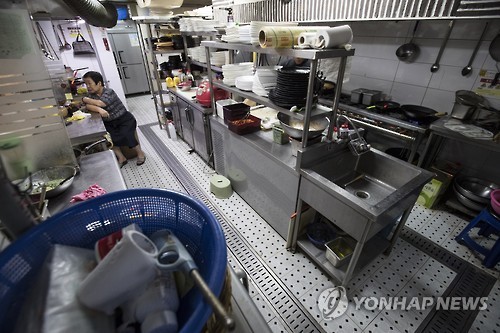South Korea's restaurant business fell into its severest slump in five years in September, state statistics showed Thursday, beaten by a protracted economic slowdown and worsened by an overcrowded market.
The production index for restaurants in the month fell to 85.2, the lowest since 83.9 of September 2011, according to Statistics Korea. The index gives numbers to production activities by analyzing sales and other related factors. The base year is 2010, with a number higher than 100 indicating more active output and lower than 100 meaning blunted production activities.

The index hit its highest in December 2010 at 115.9 and stayed close to 100 in a pendulum. It recorded 106 in December 2015 and fell to 90 throughout this year before plunging in September.
Officials at the statistics agency cited an overall economic drop as the key reason, with conditions made worse by the baby boomer generation, now reaching retirement age, entering the restaurant business and crowding the market. Delivery foods and other types of casual eateries are the most commonly picked businesses by people, either laid off from corporate restructuring or retired, who need to continue to work to make a living.
"The number of customers has fallen since the economy is not good. The restaurant business overall hasn't done well," an agency official said.
A wider analysis showed that the restaurant and accommodations business fared the worst in the services sector, being the only one among 13 categories whose index has been under 100 every month this year.
"When shipbuilding and steel plants close down from restructuring, restaurants near the plants also close down and disappear," professor Kim Kwang-seok of Hanyang University said.
"The restructuring of restaurant businesses will continue with corporate restructuring."
Even people who are not subject to the anti-corruption law are dining out less, he said, referring to the new law that prohibits providing free meals to people who can influence one's personal interest.
"The restaurant business could be negatively affected by the law until the first half of next year," he said. (Yonhap)







